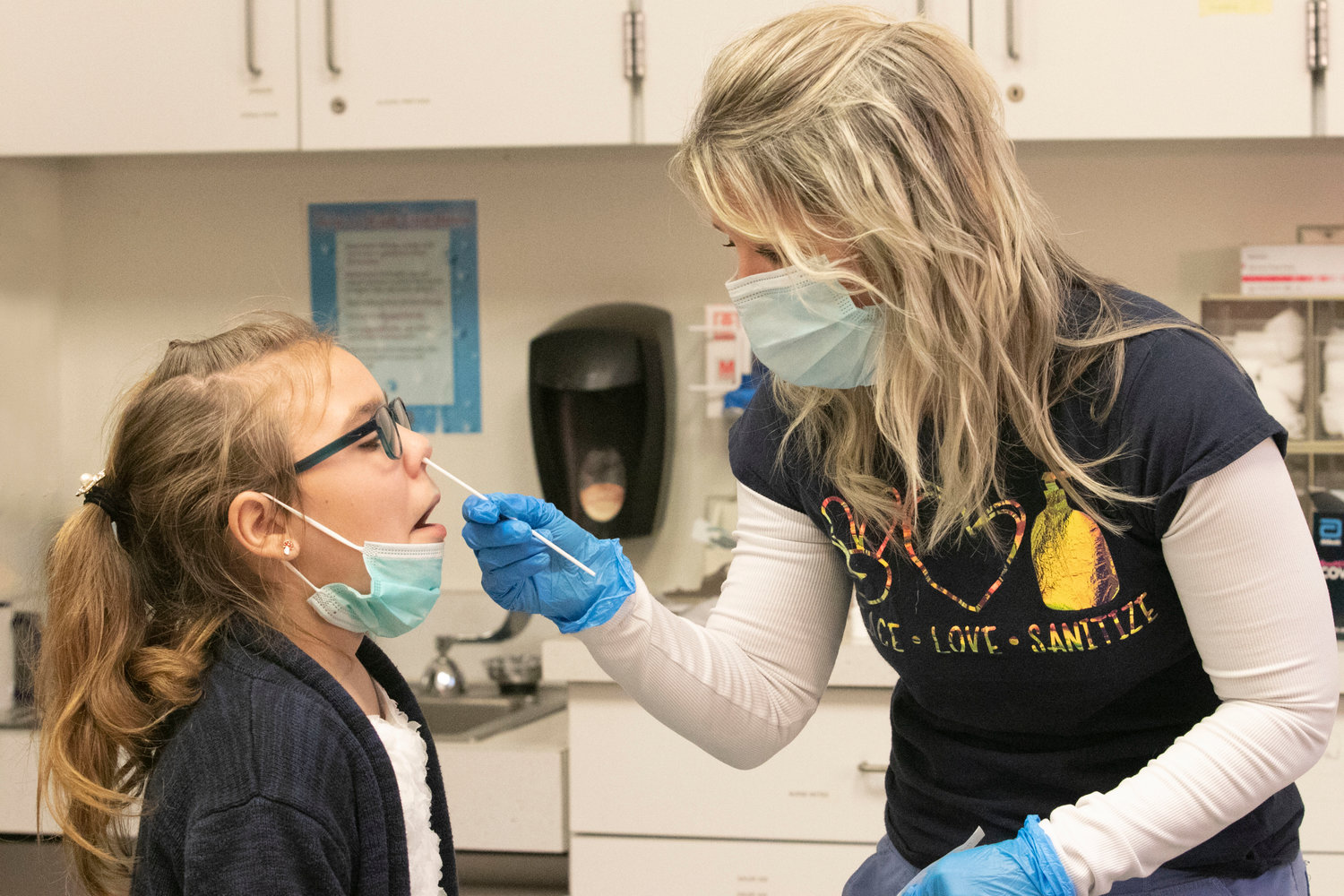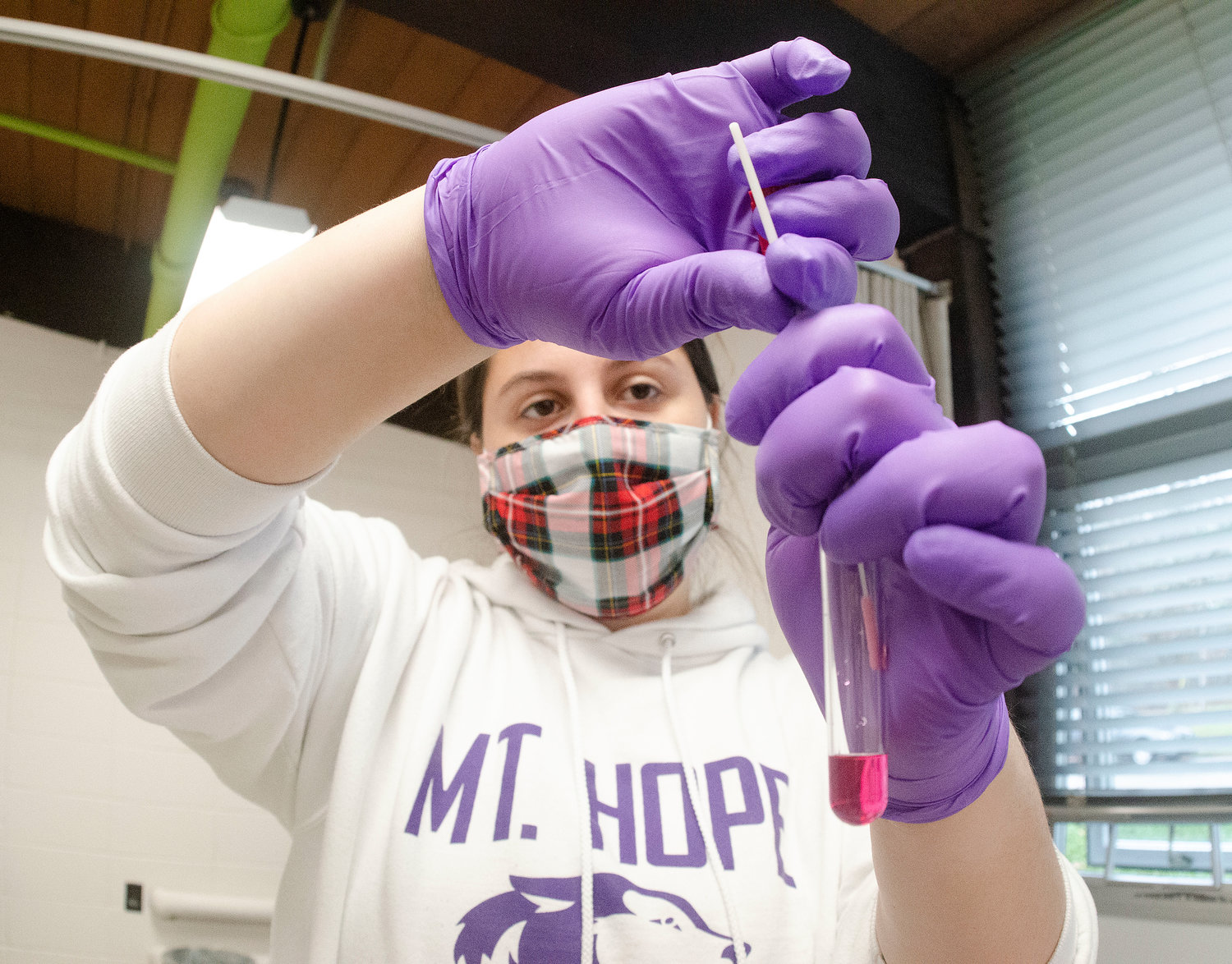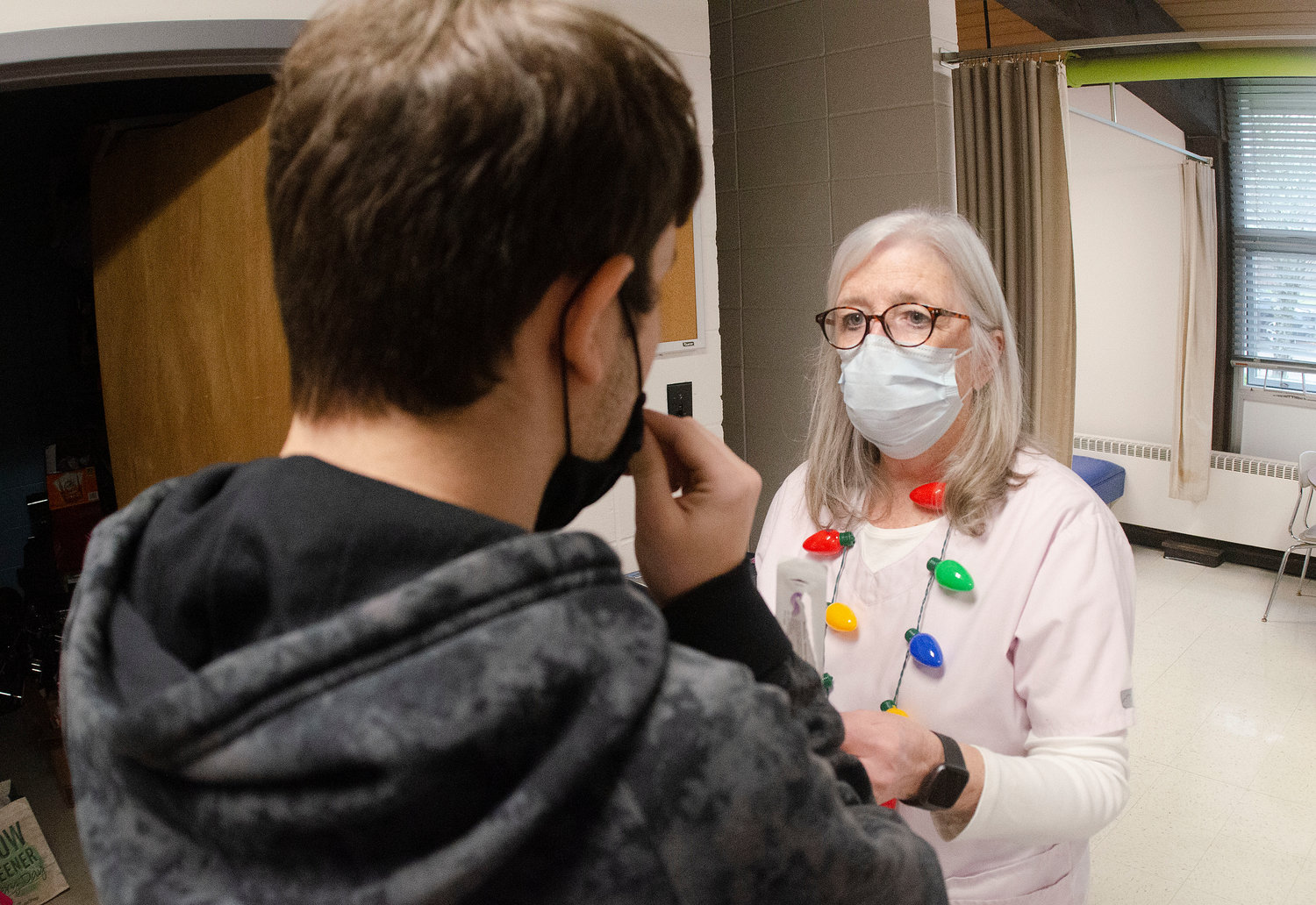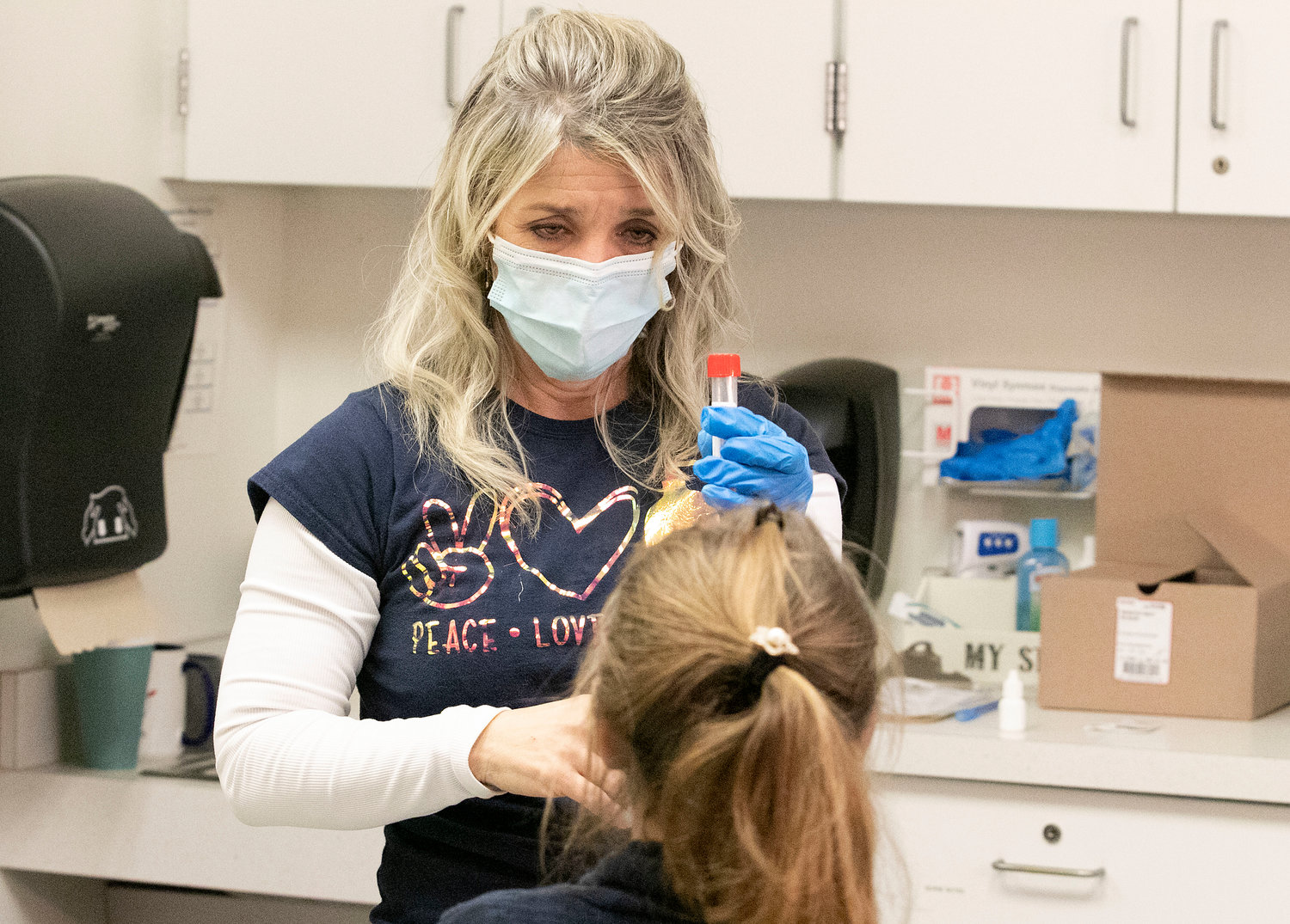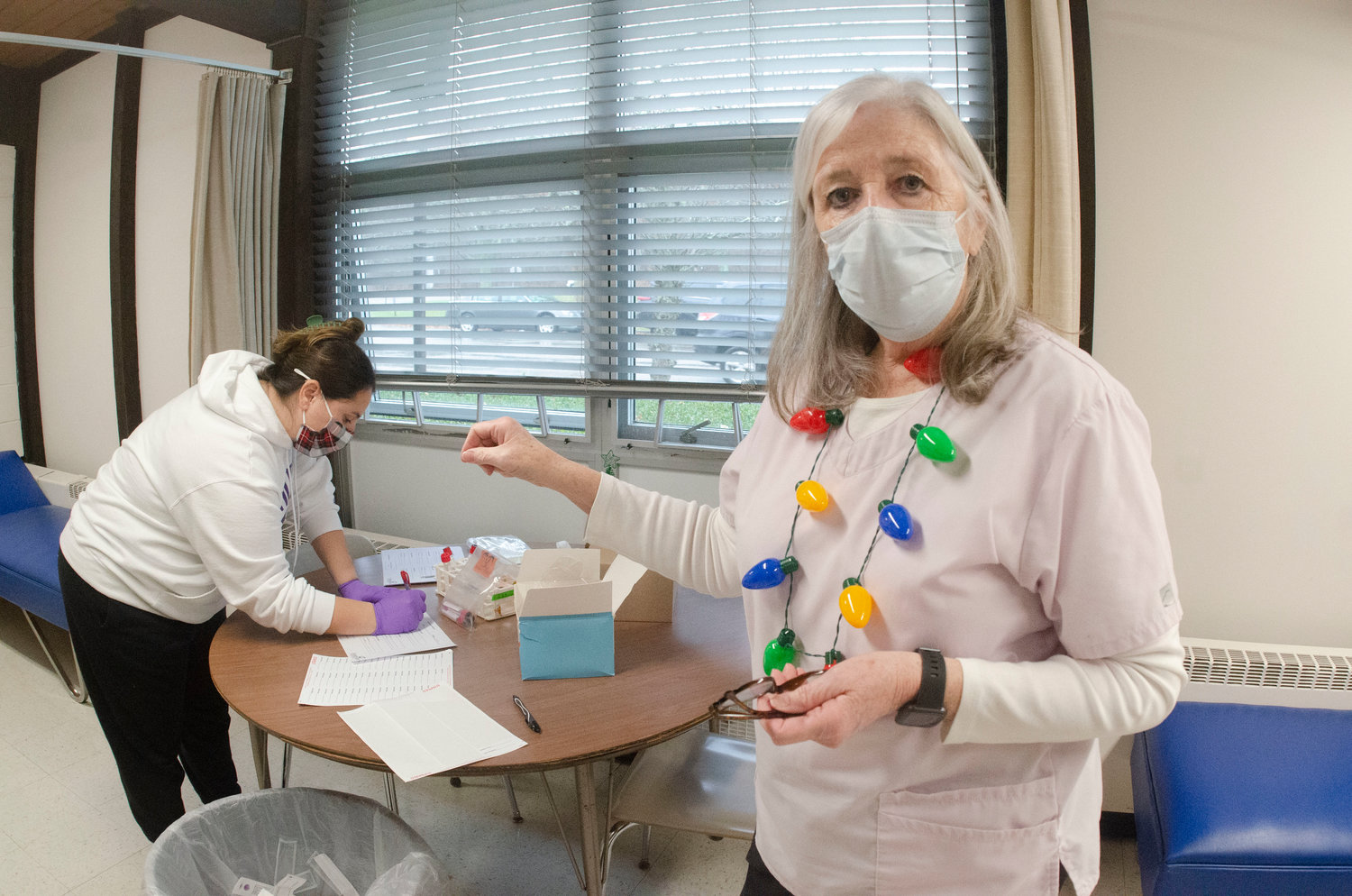- TUESDAY, JULY 16, 2024
School nurses — From the shadows to the Covid front lines
The role of the school nurse has changed more dramatically in two years than any position in education — for better and worse
Back in the old days of two years ago, many parents could go years without hearing from a school nurse. Sometimes their child could pass through an entire school, K to 3, with nary a call or visit …
This item is available in full to subscribers.
Please log in to continue |
Register to post eventsIf you'd like to post an event to our calendar, you can create a free account by clicking here. Note that free accounts do not have access to our subscriber-only content. |
Day pass subscribers
Are you a day pass subscriber who needs to log in? Click here to continue.
School nurses — From the shadows to the Covid front lines
The role of the school nurse has changed more dramatically in two years than any position in education — for better and worse



Back in the old days of two years ago, many parents could go years without hearing from a school nurse. Sometimes their child could pass through an entire school, K to 3, with nary a call or visit with the nurse.
As with most things, times have changed.
Today the school nurse is a constant, and most parents not only know her, they’ve had a recent conversation with her. Today the school nurse is one of the most important people in the building — maybe she always was, but she was never so visible.
“People know we exist now. We weren’t flying high on anyone’s radar for years. We used to do our jobs quietly. Now we’re kind of in your face,” said Ellen Estrella, nurse at Mt. Hope High School in the Bristol Warren Regional School District.
Covid has brought the school nurse into the forefront of everything happening in that building, changing her role more dramatically than perhaps any other role in education.
“We’re more influential now. We’re heard more often now. We’re asked more often for our opinion,” Estrella said.
This newfound influence comes with strings attached. On the one hand, the nurse has a stronger voice in the administration of the school; on the other hand, she is still not the decision-maker, just the messenger, and that messenger is frequently in the crosshairs of angry, agitated parents.
For the first time in their history, the nurses are frequently the “bad guys,” delivering frustrating news to parents who are weary from the pandemic. By all accounts, the role of the school nurse is dramatically different today than it was two years ago.
Staying current
When Covid first arrived, in the spring of 2020, Rhode Island closed all its school buildings. The nurses went weeks with almost nothing to do — nothing involving actual students. But that’s when their educations began.
In nearly every school district, and every private school, the nurse emerged as the local medical expert. In the summer of 2020, most spent significant time reading about Covid, attending meetings about Covid and helping draft policies around Covid, in preparation for a return to school that fall. When buildings did reopen in September of that year, the nurses were often the leading Covid experts in the district.
“We are in meetings like we’ve never been in meetings before,” Estrella said. “As a nursing team, we used to meet once a month. Now we meet every single week for an hour. We’ve been at school committee meetings … We’re being asked to step up and speak out … Meetings have consumed a lot of our time and energy.”
Diane Wallace is school nurse at Riverside Middle School and Head Nurse for the East Providence School District. “My meetings have increased more than 100 percent — meetings with department heads, with the state. There are so many meetings, it’s incredible,” she said.
Even pre-pandemic, East Providence required their school nurses to have bachelor’s degrees. Many have either master’s degrees or certificates specific to school nursing. In addition to the credentials, Wallace wants people with experience on her team.
“A school nurse is in a building by themselves. They’re the only medical person in that building. I want them to be able to know how to handle an emergency when it happens, know how to handle different situations when students come into the clinic … So experience really matters,” she said.
Managing Covid
Two years ago, a school nurse might spend her day handing out Tylenol for headaches, monitoring a couple of upset stomachs and cleaning some skinned knees or elbows. In the younger grades, she might help an embarrassed student who tried to “hold it” a little too long and didn’t get to a restroom in time. In all grades, she might evaluate a student for a concussion suffered in gym class.
Today, all those situations continue, but Covid has doubled the workload. Covid screening, testing and contact tracing have taken over the job.
“About 80 to 90 of our time is spent on Covid — doing testing, assessing the students when they come in, phone calls, tracking down negative or positive tests, advising parents on quarantine or isolation guidelines … there are so many things we do,” said Wallace of East Providence. “We work straight through every day. I don’t know one of my nurses who takes a lunch break or a coffee break or anything like that.”
All the nurses say contact tracing is a constant. They get Covid-positive notifications every day of the week, on weeknights, throughout the weekend. They respond by pulling up seating charts, talking to teachers, analyzing class schedules, building spreadsheets of ‘close contacts’ to be submitted to the department of health, figuring out who they need to test in school the next day.
“These days it seems like we’re all in contact tracing mode. It feels like that’s how we spend the majority of our days,” said Julie Pirri, nurse at Colt Andrews Elementary School in downtown Bristol.
Bearers of bad news
As they learn of positive test results — a ‘positive’ being bad news for a family — nurses advise families about what they are required to do, about how long their child must remain outside of school, or about what is required for their “close contact” children to return to school. Sometimes those conversations go badly.
“I interact with a lot more families who are positive than are negative, but the ones that are negative, they are ruthless,” said Pirri. “No matter what evidenced-based data you present, no matter what guidelines you refer them to, it doesn’t matter. Some just feel the rules don’t apply to them — that Julie Pirri and every other school nurse made these rules, and they hate us for it.”
Her colleague, Ellen Estrella, sees much of the same.
“The problems come from the people who don’t agree, who don’t believe Covid is real, or who believe it only affects older people, who believe children aren’t dying from it, that children aren’t getting seriously ill from it … Those are the people who are angry, are sometimes extremely unreasonable, are rude,” Estrella said. “What I’ve learned is, you can’t have a conversation with these people, even if you try to be polite. Being in the position we’re in, we can’t just hang up on people, but there have been times when I’ve had to say, ‘this conversation is over,’ and just hang up.”
Estrella believes there is some element of fatigue among parents. “When I tell you that people have been screaming — I mean, screeeaaaming. You can interview school nurses around the country; this has been a brutal school year. This year is worse than last year. People are tired of this.”
Those reactions are not isolated to the Bristol Warren district. Wallace and her team face them in East Providence, too.
“Not too long ago, I spent a whole day getting yelled at. And I’m just trying to help,” she said. “I usually try to stay calm, put myself in the other person’s shoes, realize the stress they’re under. Usually when you speak calmly to someone, they calm down. If you raise your voice, they’re going to raise their voice.”
A new role for nurses
Again, this is a new role for the nurse, who has historically been the caregiver, the nurturer, the comforting presence in the school. “We’re not used to being an adversary. We’re usually there to support everyone. It’s a role none of us likes,” Wallace said.
Wallace hears about many of the confrontational conversations throughout the district. “It’s my job to call the parents and see what more we can do. Sometimes we can make it better, and sometimes we can’t,” she said.
Estrella wants everyone to understand the plight of the school nurse, who is often just the messenger. “I don’t know anybody who went into nursing to be the evil person. We didn’t go into the profession so that when we enter a classroom, we’re like the Grim Reaper. We got into this profession as nurturers, as people who care, as people who want to help others in their time of need, to educate them about their health … so yes, you can easily be worn down right now.”
Said Pirri, “It’s a different type of nursing now. We can’t quite be the clinical nurse to the fullest potential, because we’re so focused on what’s immediately at hand — how to keep our kids safe, making sure we’re helping families follows rules and guidelines, while making sure we put our bullet-proof vests on. We’re not the ones making these guidelines; we’re just enforcing them.”
The rules, rules, rules
Like her counterparts in Bristol Warren, Wallace said they get as much positive feedback as they do negative. There may be more of that coming soon. As they return from their holiday vacations this week, most districts are adapting a “test to stay” model. It means unvaccinated students — which includes almost every student in the youngest grades — can return to school, even if a family member is home sick with Covid, as long as they receive a negative test in the nurse’s office each day during the infectious period.
“One thing that bothered families the most was when one person was sick with Covid, the entire family was forced to quarantine. That’s changing with ‘test to stay.’ We’re not requiring the children in the family to stay home from school. They can come to school if they’re not sick. We are making more allowances to keep them in school, and I think that is a big de-stressor for families,” Wallace said.
“It’s always our goal to keep students in school. In a way, this is their profession right now. They’re students. They come to school, they learn, they experience. That is what helps them grow to become the best adults they can be … So we do try to keep them in school.”
Estrella said the nurses spend much of their time explaining to parents — and justifying — the differences in policies for the vaccinated vs. the unvaccinated. She also said many other parents know the rules inside and out; they just don’t like them.
“One thing that’s killing us, is that Massachusetts does some things differently. So we have to hear about that, and some people don’t talk to you like I’m talking to you right now. It’s at a volume that is about 20 decibels higher. So it’s hard, it’s really hard. This has been the most unpleasant year I’ve had in my entire career.”
Support from above
In both of the districts included in this story, administrators have bolstered their nursing staffs in the past year. The Bristol Warren district hired “nurse techs” for every school last year. They are either CNAs, medical assistants, or in the case of Mt. Hope High School, the school’s athletic trainer, who now serves as the nurse’s aide during the day and the athletic trainer in the evenings.
This year, Bristol Warren decided that two of its elementary schools (Rockwell and Guiteras) could share one nurse tech, and they hired a second full-time nurse for Hugh Cole Elementary School in Warren. The nurse techs don’t treat the major cases, like head injuries or serious medical conditions, but they are trained in all the Covid protocols and testing, and they assist with all of the more routine situations.
The East Providence district just hired another full-time nurse to buttress their staff this year, after bringing on board an additional nurse last school year. The district also hired a new administrative assistant for the nursing department, and she spends much of her day making phone calls or communicating with families.
The district uses nursing subs all the time to give the full-time staff some relief. “Sometimes they need a day to recharge, and often a day is enough,” Wallace said. “The school department has been very good to the nursing department. I am very fortunate in East Providence to have an administration that generally cares about the staff, wants to make sure that they have everything we need to do the job.”
Pirri from the Bristol Warren district said the same.
“I feel more supported by our administrative team,” she said. “They rely on us, they trust us, and they do value our opinion.”
For the past year, Bristol Warren nurses have been receiving extra stipends for their contract tracing efforts, which often play out over the weekend and have them sometimes working seven days a week.
“It’s appreciated,” Estrella said. “It would be more appreciated if we weren’t doing it, but we’ve been very fortunate that our district stepped up to both recognize our worth, and compensate us.”
Their wish lists
Each of the nurses was asked what more could be done to support them, boost their resources or make the job more manageable. They all talked about vaccines.
“Get vaccinated. Vaccinate your children,” Wallace said. “I know it’s controversial with some people. I’m not here to argue a point or push someone into it, but I strongly believe in the vaccines, after being in medicine for 45 years … That is the one thing I would advocate for, in the district, across the state, and across the country — vaccinations.”
Throughout 2021, Bristol hosted numerous vaccination clinics, and school nurses frequently volunteered their time. At the first of those, when senior citizens were getting their first doses, the feeling was electric.
“I felt like I had the golden ticket from Willy Wonka,” Pirri said. “These people were so happy. That was the best experience of my career. And we were doing it for free. It was just so rewarding.”
Estrella was named the Bristol Warren teacher of the year. At the ceremony, she told Gov. Dan McKee that sticking needles in arms was the highlight of the year. “It was such a positive thing,” she said. “We felt like we were really contributing something positive to the community. They were long days, but you felt like you were moving toward the light.”
She wishes more people would move toward the light of vaccination.
“This is public health. This isn’t about just me. This is about all of us, and it’s about each person who we affect,” Estrella said.
“People have said that kids shouldn’t have to bear the brunt of this. No, they shouldn’t. But they’re a piece of the public. They have grandmothers and grandfathers, they might have a neighbor who is not well … Public health is the public taking care of the public. It’s about the greater good, and we have to act for the greater good. People don’t want to hear that, which is unfortunate, but it’s pretty simple: get vaccinated, wear your mask, stay home if you’re sick.”
Love for the job
Though the job has changed radically, and burnout is a constant risk, the school nurses said they love what they do.
“We’re all in this for the safety and well-being of our kids. If we just stay focused and positive about what our ultimate goal is, it’s the thing that keeps us going,” Pirri said.
Wallace said this has been the best job of her life.
“Every student in the district, even though I don’t see them every day, I’m responsible for them. That’s how I look at it, and I take that responsibility very seriously, for them and their families.
“I’ve been a nurse for so long, and been in so many positions, but being a school nurse is the most gratifying experience of my career,” Wallace said. “I love it all. I really do.”
Estrella also loves her job, and she hopes people can try to understand how hard she and the other nurses are working every day.
“I’d like it if people could try to be kinder, and patient. I understand they’re not happy; we’re not happy either. But we need you to understand we’re human beings. We’re not here to inflict harm at anyone. Don’t yell at us. Don’t yell at our administrators. Don’t yell at our teachers.”
She continued, “People don’t understand how difficult this has been. People who work in schools are human beings too, and we have families. We’re all just trying to do the best we can and come out on the other side of it. If people could just be kinder and more patient, it would make a big difference.”
Other items that may interest you

